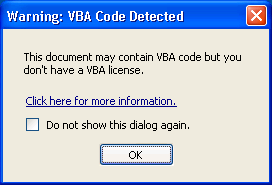In this topic
Using VBA at ArcGIS 10.1
VBA is not included in the default installation of ArcGIS for Desktop applications. To use your VBA customizations, you need to run the VBA Compatibility setup. This setup installs the VBA runtime (used in ArcGIS for Desktop applications).
In addition to installing the software components, you need to enable the VBA license feature to use VBA as a developer or an end user. You cannot use the VBA developer environment or VBA code in existing documents without the VBA license feature. If you open a document that contains VBA code, and you do not have the feature fully installed, the following warning message appears:

The VBA code editor and integrated development environment (IDE) menu options only appear on the Customize dialog box if the VBA feature is properly installed and configured.
VBA authorization numbers are not included with the VBA install, nor included automatically with their other authorization numbers. Obtain a VBA authorization number by contacting your Customer Service representative directly via e-mail.
Migrating VBA code
While VBA offers a convenient entry point for customizations, it does not provide a solution for many scenarios, and adds complexity to the sharing and deployment of functionality. Many tasks undertaken by VBA developers involve a lot of work with fine grained ArcObjects.
Starting at ArcGIS 10, desktop developers have two ways of customizing ArcGIS for Desktop. The adoption of Python as the scripting language for ArcGIS 10 provides many opportunities for automating workflows that were only possible in the past by using VBA. If your VBA code uses user interface (UI) components (commands, tools, menus, and so on), the ArcGIS for Desktop add-ins provide an alternative to VBA. ArcGIS for Desktop add-ins are straightforward to develop using Visual Studio tools and easy to deploy since they do not require full administrator rights to install.
For more information on ArcGIS for Desktops add-ins, see Building add-ins for ArcGIS for Desktop.
See Also:
How to migrate ArcGIS 9.3.x and 10 Desktop and Engine stand-alone applications to ArcGIS 10.1Migrating ArcGIS 9.3.x and 10 Desktop and Engine custom components to ArcGIS 10.1
Building add-ins for ArcGIS for Desktop
| Development licensing | Deployment licensing |
|---|---|
| ArcGIS for Desktop Basic | ArcGIS for Desktop Basic |
| ArcGIS for Desktop Standard | ArcGIS for Desktop Standard |
| ArcGIS for Desktop Advanced | ArcGIS for Desktop Advanced |
